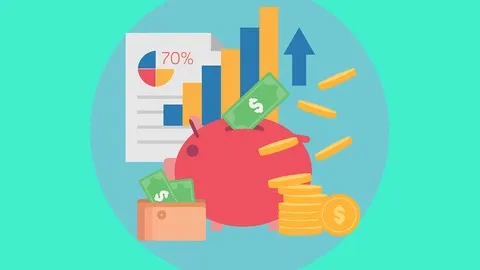
Free Accounting Tutorial - Introduction to Financial Accounting 
This free accounting tutorial is an introduction to financial accounting. It covers topics such as the income statement and balance sheet formats, definitions of words used in financial statements, recording transactions, creating an income statement and balance sheet, outlining the cash flow statement's format, and the difference between profit and cash. This course is perfect for those looking to learn the basics of financial accounting and gain a better understanding of the subject. ▼
ADVERTISEMENT
Course Feature
![]() Cost:
Cost:
Free
![]() Provider:
Provider:
Udemy
![]() Certificate:
Certificate:
No Information
![]() Language:
Language:
English
![]() Start Date:
Start Date:
Self Paced
Course Overview
❗The content presented here is sourced directly from Udemy platform. For comprehensive course details, including enrollment information, simply click on the 'Go to class' link on our website.
Updated in [May 25th, 2023]
This free accounting tutorial provides an introduction to financial accounting. Learners will gain an understanding of the income statement and balance sheet formats, as well as the words used in financial statements such as accounts receivable, prepayments, etc. They will learn how to record transactions on the financial statement, such as invoicing, raising equity, and buying inventory. Additionally, learners will be able to make a straightforward income statement and balance sheet, as well as outline the cash flow statement's format. Finally, learners will gain an understanding of the difference between profit and cash.
[Applications]
After completing this course, participants should be able to apply their knowledge to create financial statements, record transactions, and understand the differences between profit and cash. They should also be able to explain the income statement and balance sheet formats, define the words used in financial statements, and outline the cash flow statement's format. Additionally, they should be able to make a straightforward income statement and balance sheet.
[Career Paths]
1. Accountant: Accountants are responsible for preparing and analyzing financial statements, ensuring accuracy and compliance with applicable laws and regulations. They also provide advice on tax planning and budgeting. As the economy continues to grow, the demand for accountants is expected to increase.
2. Financial Analyst: Financial analysts provide advice and guidance to businesses and individuals on investments, financial planning, and budgeting. They analyze financial data to identify trends and make recommendations on how to maximize profits and minimize risks. With the increasing complexity of the global economy, the demand for financial analysts is expected to grow.
3. Financial Manager: Financial managers are responsible for managing the financial resources of an organization. They develop and implement strategies to maximize profits and minimize risks. They also oversee the preparation of financial statements and ensure compliance with applicable laws and regulations. As the economy continues to grow, the demand for financial managers is expected to increase.
4. Tax Accountant: Tax accountants are responsible for preparing and filing tax returns for individuals and businesses. They also provide advice on tax planning and compliance with applicable laws and regulations. With the increasing complexity of the tax code, the demand for tax accountants is expected to grow.
[Education Paths]
1. Bachelor of Accounting: This degree program provides students with a comprehensive understanding of accounting principles and practices. Students learn how to analyze financial statements, prepare financial reports, and use accounting software. Additionally, they gain an understanding of taxation, auditing, and financial management. This degree is becoming increasingly popular as businesses become more reliant on accurate financial data.
2. Master of Science in Accounting: This degree program provides students with an advanced understanding of accounting principles and practices. Students learn how to analyze complex financial statements, prepare detailed financial reports, and use sophisticated accounting software. Additionally, they gain an understanding of taxation, auditing, and financial management. This degree is becoming increasingly popular as businesses become more reliant on accurate financial data.
3. Master of Business Administration (MBA) with a Concentration in Accounting: This degree program provides students with a comprehensive understanding of business principles and practices. Students learn how to analyze financial statements, prepare financial reports, and use accounting software. Additionally, they gain an understanding of taxation, auditing, and financial management. This degree is becoming increasingly popular as businesses become more reliant on accurate financial data.
4. Certified Public Accountant (CPA): This certification program provides students with a comprehensive understanding of accounting principles and practices. Students learn how to analyze financial statements, prepare financial reports, and use accounting software. Additionally, they gain an understanding of taxation, auditing, and financial management. This certification is becoming increasingly popular as businesses become more reliant on accurate financial data.
Course Syllabus
Introduction
Downloadable Files
Session Objectives
The Three Key Financial Statements
The Balance Sheet: Assets
The Balance Sheet: Liabilities
The Balance Sheet: Shareholders' Equity
Balancing The Balance Sheet
Recording Transactions
Issuing Shares For 100 in Cash
Taking Out a Four Year Bank Loan
Buying a Property For 80
Buying Inventory For 60
Selling All Inventory For 90
Paying Salaries of 20
Paying Interest of 3
Current Assets Quiz
Defining Accounts Receivable and Payable
Buying and Selling on Credit
Valdero Inc. Exercise
Balance Sheet Quiz
Session Objectives
Role of the Income Statement
Income Statement: Gross Profit
Income Statement: Operating Income
Income Statement: Net Income
Creating a Full Income Statement
Recording Income and Expenses
Prepayments
Recording Expenses Part 2
Accrued Expenses
Finance Term Quiz
Luton Inc. Exercise
Depreciation
The Impact of Depreciation
Jenga Inc. Exercise
Quiz
Session Objectives
Downloadable Files
Three Key Financial Statements Review
The Role of Cash Flow Statement
The Cash Flow Statement: Operating Cash Flows
The Cash Flow Statement: Investing Cash Flows
The Cash Flow Statement: Financing Cash Flows
Profit vs. Cash Flow
The Idea of Matching Over Time
Matching Over Time Solution
PP&E Depreciation Recap
Depreciation and the Three Financial Statements
Different Types of Depreciation Methods
Calculating Operating Cash Flows - Direct Method
The Indirect Method
Operating Cash Flows - Indirect Method
Operating Cash Flows Example Period 1
Period 1 Solution
Operating Cash Flows Example Period 2
Period 2 Solution
Operating Cash Flows Example Period 3
Period 3 Solution
Operating Cash Flows Quiz
Johannes Operating Cash Flow Exercise
Deriving the Complete Cash Flow Statement
Stage One - Compare the Balance Sheets
Comparing Assets and Liabilities
Stage Two - Classifying the Cash Flows
Classifying Working Capital Cash Flows
Dealing With Property, Plant and Equipment (PP&E)
Calculating Net Capital Expenditures (Capex)
Net Capital Expenditure Quiz
Dealing With Retained Earnings
Preparing a Cash Flow Statement Exercise
Course Provider

Provider Udemy's Stats at AZClass
Discussion and Reviews
0.0 (Based on 0 reviews)
Explore Similar Online Courses

Web3 and Blockchain Transformations in Global Supply Chains

Scalable Web Development in Rust

Python for Informatics: Exploring Information

Social Network Analysis

Introduction to Systematic Review and Meta-Analysis

The Analytics Edge

DCO042 - Python For Informatics

Causal Diagrams: Draw Your Assumptions Before Your Conclusions

Whole genome sequencing of bacterial genomes - tools and applications

Goods and Service Tax in India : A Brief Introduction

The Basics of Business Accounting

Cost Accounting and Artificial Intelligence Tools: Part 1
 Related Categories
Related Categories
 Popular Providers
Popular Providers
Quiz
 Submitted Sucessfully
Submitted Sucessfully
1. What is the difference between profit and cash?
2. What is the purpose of the income statement?
3. What is the purpose of the balance sheet?


Start your review of Free Accounting Tutorial - Introduction to Financial Accounting